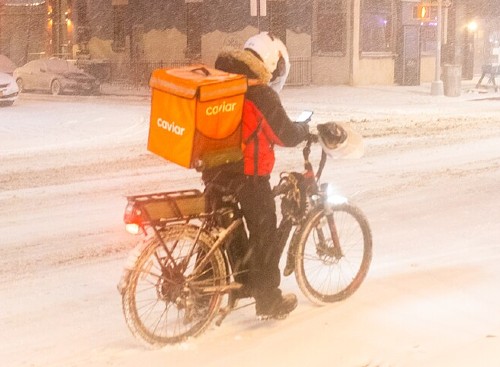
Last November, New York City voters chose — from a uniformly awful candidate menu — “democratic socialist” Zohran Mamdani for mayor. They’re already starting to experience, and may even learn from, the consequences of that choice.
“Democracy,” HL Mencken wrote, “is the theory that the common people know what they want, and deserve to get it good and hard.”
Unfortunately, everyone else gets it good and hard, too.
The coalition that elected Mamdani consisted mainly of middle- and upper-income voters.
You know, the people who hail an Uber instead of taking the subway, and order their restaurant food via DoorDash instead of rubbing elbows with the hoi polloi at local delis, pizzerias, and Chinese take-out joints.
Mamdani lagged his main opponent, Andrew Cuomo, among lower-income voters.
You know, the folks who build those sandwiches, bake those pizzas, and stir-fry those veggies. The people who stand in line to save a buck rather than pay delivery fees atop food costs. And, of course, the people who drive for Uber and deliver for DoorDash.
In other words, the “workers” Mamdani and his ilk claim to “support.”
That “support” takes the form of all-out war on the “gig economy.”
The premise of socialism is “worker control of the means of production,” and the gig economy is far and away the most successful experiment in human history when it comes to achieving that.
Gig workers own their tools. Gig workers set their own hours. Gig workers choose who they work for, where they work, and what kind of work they do. Gig workers even set their own salaries by accepting the individual tasks that meet their pay requirements and rejecting those that don’t.
Mamdani and friends hate that worker control with a passion. To them, worker happiness and welfare only matter to the extent that they can claim credit for, and gain power from, that happiness and welfare.
It drives them crazy to see workers not punching campaign donors’ time clocks, not paying dues to politically connected “organized labor” groups, working for amounts they consider acceptable instead of for government-set “minimum wages,” and maybe even lightening their own tax burdens by working for cash or engaging in some creative accounting.
For the Zohran Mamdanis of the world, “democratic socialism” is really just a nicer-sounding term for socialism’s Mussolinist — that is, fascist — variant: “Everything within the state, nothing outside the state, nothing against the state.”
So the new NYC regime is hell-bent on making it harder for gig workers to get work, get paid, get tipped … get BY, with everything from “minimum wage” enforcement to controlling how apps treat tipping. Because if anyone, anywhere, somehow manages to make a living without Mamdani’s permission, why, that’s “exploitation.”
No wonder they didn’t vote for him!
Mamdani’s “middle and upper class” supporters are getting it good and hard, too.
It turns out that his “democratic socialist” antics drive up prices for on-call transportation and food/grocery delivery.
Who, other than anyone with a basic grasp of economics, could have predicted THAT?
Thomas L. Knapp (X: @thomaslknapp | Bluesky: @knappster.bsky.social | Mastodon: @knappster) is director and senior news analyst at the William Lloyd Garrison Center for Libertarian Advocacy Journalism (thegarrisoncenter.org). He lives and works in north central Florida.
PUBLICATION/CITATION HISTORY


